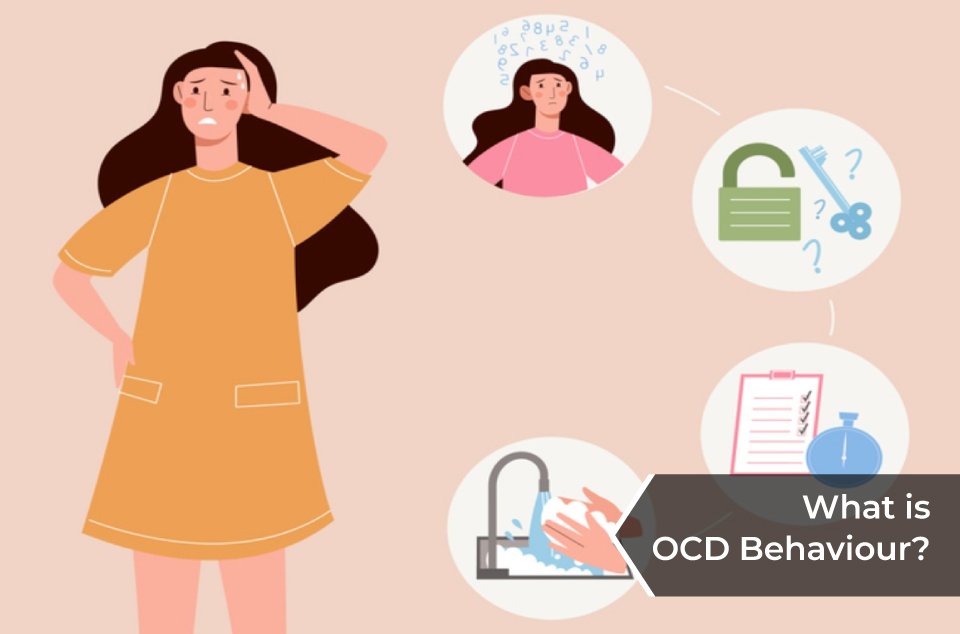What is OCD Behaviour?
Imagine you double-check the front door lock three times before leaving. Then, you come back to check it again. This might be because of obsessive-compulsive disorder (OCD), a mental health issue. A psychiatrist says OCD is more than just odd habits.
OCD isn't about being neat or organized. It's about dealing with scary thoughts through rituals. Psychiatrists say OCD is serious when it takes up a lot of time each day. For many in India and worldwide, it's a real challenge, not a personal failing.
Seeing OCD through a psychiatrist's eyes means it's treatable. Calling perfectionism OCD is wrong and ignores the real struggles of those affected. This blog by Dr. Tejas Patel, the Best Psychiatrist in Ahmedabad at Mindcare Hospital, aims to explain OCD's science, what is OCD behaviour, and why getting help is key to taking back control of life.

Understanding Obsessive-Compulsive Disorder
Knowing the difference between habits and OCD is necessary and it starts with understanding its roots. Let's know its definition and what makes it different from common behaviours like perfectionism.
The Clinical Definition of OCD
For an OCD diagnosis, doctors look for two main things. They check for unwanted thoughts and actions done over and over. These must cause worry and get in the way of daily life. The DSM-5 criteria help spot OCD correctly and what is OCD behaviour, differentiating it from normal habits.
OCD vs Perfectionism
Many get confused about whether the actions are prompting towards being perfect or signaling OCD! Let's help you understand. Perfectionism is about wanting things perfect, but it doesn't come with the anxiety of OCD. For example, organizing books neatly is not OCD- it's a personal choice. True OCD is about doing rituals to stop unwanted thoughts, not just liking things neat.
Also, OCD is when you continuously wash your hands, repeatedly, because you feel you will get sick or harm others. When it is about perfectionism, you wash hands to clean your hands without having intrusive thoughts. This helps understand what is OCD behaviour and the normal traits of mental illness.
Why OCD Occurs?
This mental health problem occurs to many but why? Studies show OCD neurobiology involves brain parts linked to fear and habits. Imbalances in serotonin and dopamine, along with genetics, play a part in making a person develop obsessions and compulsions. Many diagnostic scans show overactive areas like the orbitofrontal cortex- these make rituals hard to stop.
But the good part is- this view sees OCD as a treatable condition. It's not just a habit that you can't get rid of. Just help yourself by making an appointment with our expert!
Common OCD Behaviour Patterns You Should Recognize
Spotting compulsive behaviours tied to OCD begins with noticing habits that feel like a must. For example, washing hands until they're red or checking doors many times a day might show more than just a habit. These actions often come from obsessive thoughts like "What if I get sick?" or "Did I harm someone?"
If you ask ‘What is OCD Behaviour?’, its signs include behaviours that take over an hour each day or cause you to avoid social events. Thoughts about harming loved ones, followed by mental rituals to "neutralize" them, are also warning signs. Unlike superstitions, these actions don't bring comfort- they create a cycle of temporary relief followed by guilt.
Experts say in India, families might call this "overthinking" or give them a spiritual reason. But true OCD really disrupts work or relationships.
As we say, if these patterns feel like a prison, not a choice, it's time to see a psychiatrist. Dr. Tejas Patel is the one from whom early help can balance cultural practices with mental health needs.
Treatments for Managing OCD
Effective OCD treatment doesn't follow a one-size-fits-all concept! OCD Behaviour Management involves -
Medication Options and Their Effectiveness
OCD medication (such as SSRIs) can reduce symptoms for some people. When you consult us, we might suggest these alongside therapy.
CBT for OCD
Cognitive Behavioural Therapy (CBT for OCD) helps challenge unhelpful thought patterns. Experts guide you to reframe obsessive thoughts and eventually reduce compulsions.
Exposure and Response Prevention (ERP) Therapy
ERP therapy is the gold standard for OCD. It involves gradual exposure to anxiety triggers while resisting compulsive behaviours and helps you prevent troublesome responses.
Lifestyle Modifications to Support Treatment
Managing OCD also involves self-care- proper sleep, balanced nutrition, regular exercise, and yoga meditation. You can join community support groups or online forums.
OCD doesn't have to control your life. The right OCD coping strategies and professional help can give you back control.
Be patient as you learn new habits and face tough thoughts. Recovery isn't about getting rid of all worries. It's about learning to manage them.
If you're noticing OCD symptoms, read What is OCD Behaviour, or want to manage them better, start by talking to our expert Dr. Patel at Mindcare Hospital in Ahmedabad. Your journey to balance starts with that first step.

